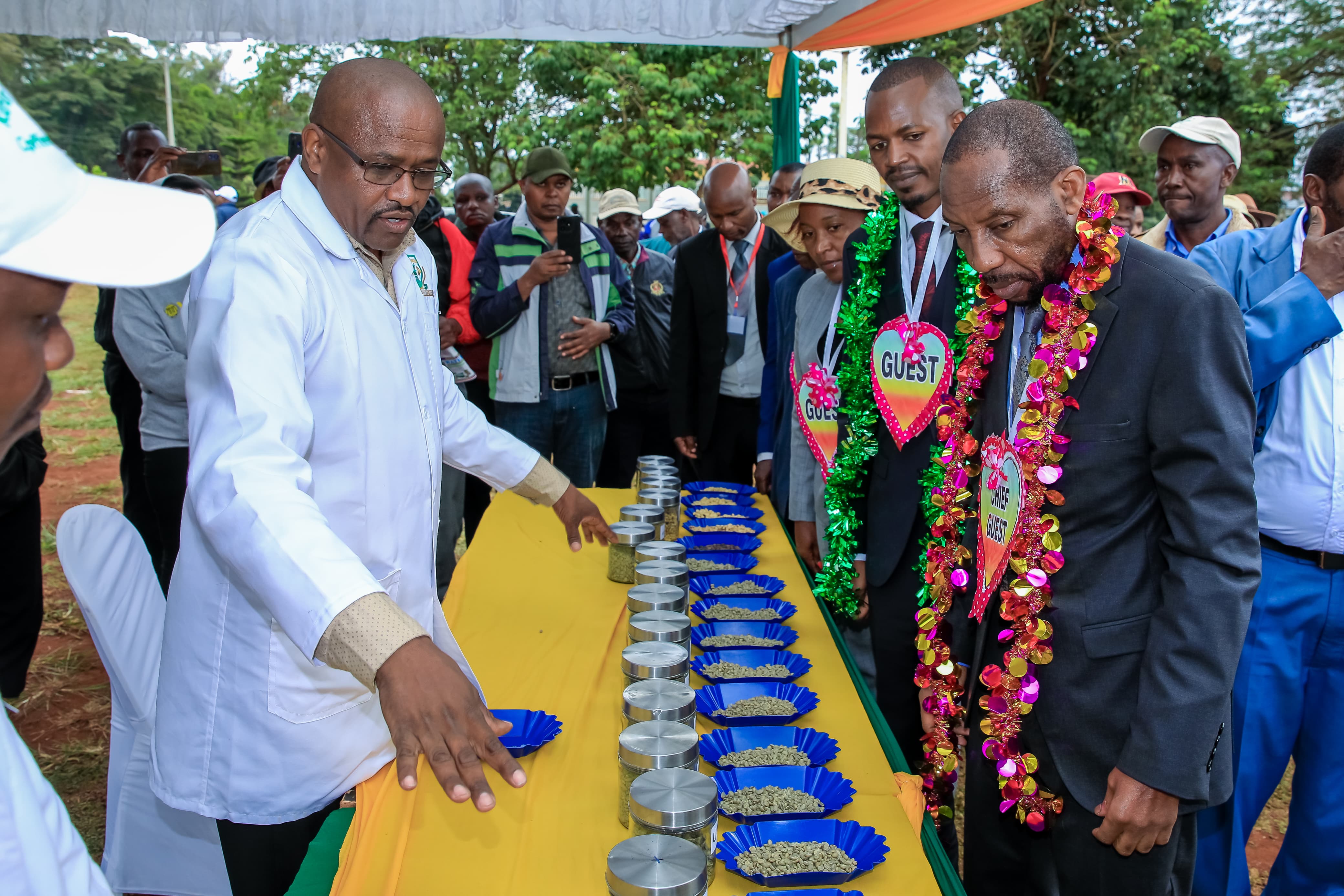 An official from Kirinyaga Coffee Mills explains the coffee processing process to Kirinyaga Deputy Governor David Githanda during Ushirika Day celebrations./ALICE WAITHERA
An official from Kirinyaga Coffee Mills explains the coffee processing process to Kirinyaga Deputy Governor David Githanda during Ushirika Day celebrations./ALICE WAITHERA
The Kirinyaga county government has called for dialogue amongst stakeholders in the coffee sector to streamline reform implementation.
Deputy Governor David Githanda urged that discussion be given a chance in the ongoing debate on Direct Settlement System (DSS) for payouts and the delegates system.
Coffee farmers have rejected the government’s move to pay them directly to their mobile phones soon after their coffee is sold, saying it will impoverish them and make it difficult to support their families.
They asked the government to continue paying them through their co-operative societies, through which they access farm inputs and loans from financial institutions.
Direct payments will cripple the co-operative movement and disadvantage them.
During Ushirika Day celebrations at Kirinyaga University, Githanda underscored the role played by co-operatives in driving inclusive economic growth and transforming livelihoods.
“As we invest in developing our cooperatives, we call for dialogue so that the interests of our farmers are safeguarded. The ministry of cooperatives should fully involve all stakeholders and have a candid dialogue with cooperators because there are divergent views on this matter,” Githanda said.
“Our cooperatives are not just community groups. They are powerful economic players improving lives and livelihoods across the county. As a county government, we fully support their role in transforming grassroots economies,” he added.
Failure to resolve the conflicts between farmers and the government risks weakening the sector that is depended upon by thousands of rural families.
Githanda, however, called for integrity and accountability from leaders of local co-operatives to safeguard members’ investments, saying the county is committed to strengthening co-operative governance to ensure transparency and compliance.
 Kirinyaga Deputy Governor David Githanda sampling locally processed milk during Ushirika Day Celebrations at Kirinyaga University./ALICE WAITHERA
Kirinyaga Deputy Governor David Githanda sampling locally processed milk during Ushirika Day Celebrations at Kirinyaga University./ALICE WAITHERA
In November last year, Co-operatives CS Wycliffe Oparanya also issued a directive that the DSS system would, from July 1, start paying to farmers’ accounts directly and asked co-operatives to hand over farmers’ data.
But the farmers have vowed to stop selling their produce should the government not heed their demands and move forward with the implementation.
The Cooperative Bill 2024 currently under review in the Senate, he said, will clarify roles, strengthen collaboration, and enhance county support for cooperatives.
Kirinyaga boasts over 126 registered co-operatives, with more than 300,000 members who have mobilised over Sh8.7 billion in savings and created more than 1,623 direct jobs.
Githanda highlighted that the county has invested Sh50 million to upgrade Kirinyaga Coffee Mills and warehouse facilities that are run by local co-operative societies to improve processing, storage and marketing capacity, enabling farmers to earn more from their produce.
In addition, the county has registered 20 ward-based Saccos that give farmers access to affordable credit, helping them expand their businesses and increase productivity.
The Deputy Governor also pointed out that modern markets have been constructed across the county to support avocado and tomato farmers, reducing post-harvest losses and allowing them to negotiate better prices.
“Our goal is to empower cooperatives by creating the right infrastructure, financial access, and governance systems,” Githanda noted.
During the event, Ollin Sacco was recognised for paying the highest dividend payout of 17.5 per cent, followed by Fortune Sacco with 13.5 per cent.
Nationally, there are over 25,000 registered co-operatives with over 14 million members actively engaged in sectors such as transport, housing, trade and agriculture.











